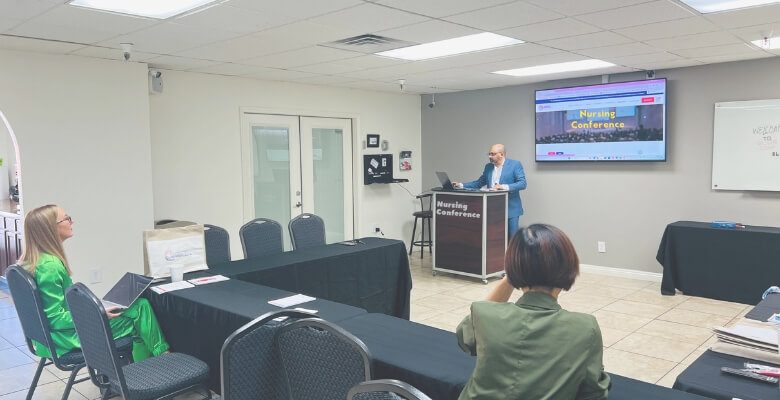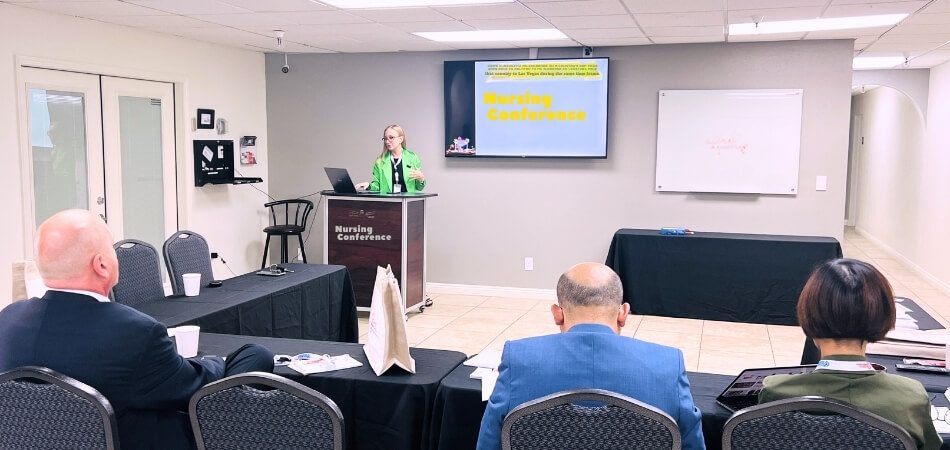Nursing conference is a valuable gathering where healthcare professionals share knowledge, discuss innovations, and advance their careers. One of the most common questions asked by people attending their first nursing conference is: What are some tips for first-time nursing conference attendees?
To maximize nursing conferences, prepare by reviewing the schedule, planning travel, and bringing essentials. Engage actively, take notes, follow up with contacts, stay energized, explore exhibits, attend social events, review nursing conference resources, review your experience, and share key takeaways.
Throughout this blog, we’ll cover effective networking strategies and proposal writing techniques to secure speaking engagements for first-time nursing conference attendees. Let’s dig deeper into how to maximize your experience at upcoming conferences.
What Happens at a Nursing Conference?
Healthcare professionals meet at nursing conferences to discuss the latest trends, research, and advancements. Experts share the latest technologies and best practices, while workshops provide hands-on learning opportunities. As a result of networking at these events, healthcare professionals can strengthen their professional relationships.

There are several nurse conferences that feature poster presentations and research papers on innovative projects and clinical studies. When you join a nursing conference Canada, participants can share knowledge and explore presentations from healthcare organizations and medication companies.
Nursing conferences are important for learning and collaboration among healthcare providers. They help nurses stay updated, expand their knowledge, and improve patient care through updated ideas and practices.
Why Should You Attend a Nursing Conference?
As an attendee of a healthcare conference, you will have the opportunity to experience many benefits. The following are a few of them:
- Career Growth: Nursing conferences offer opportunities to volunteer, network with industry leaders, and explore job and volunteer openings with nursing organizations.
- Knowledge Sharing: Attendees can share and learn about experiences, new products, techniques, and technology, benefiting both personal and team improvement in patient care.
- Continuing Education: Take continuing education classes while learning new products, technologies, and techniques that your patients will be able to use every day.
- Networking: Meet nursing professionals from different specialties and facilities, developing connections that provide knowledge and potential career opportunities.
- Reduce Stress: Conferences also include social activities to socialize with colleagues and explore the host city, providing a break from the demands of patient care.
The purpose of nursing conferences is to facilitate the exchange of knowledge, promote innovation, and support the professional development of healthcare practitioners through collaborative learning and networking.
How to Find a Nursing Conference?
Finding the right nursing conference can significantly strengthen your professional growth and networking opportunities. With so many options available, knowing where to start your search is crucial. This guide will walk you through the steps to find a nursing conference that aligns with your goals and interests.
Step 1: Explore Professional Nursing Organizations’ Websites
Begin your search by visiting the websites of major nursing organizations. These organizations frequently host or endorse conferences that are relevant to your field. Checking their websites regularly ensures you stay informed about upcoming events. Many of these conferences also offer a certificate of attendance at nursing conferences, which can be valuable for your career.
Step 2: Use Online Conference Directories
Online directories dedicated to healthcare and nursing conferences are another excellent resource. These platforms allow you to search for events by location, date, and specialty. Utilizing these tools helps you find conferences that fit your schedule and professional focus. Directories also often provide detailed information about the event’s content and speakers.
Step 3: Network with Colleagues and Mentors
Reach out to colleagues, mentors, and peers in your professional network for recommendations. They may know of upcoming conferences that would be beneficial for your career development. Personal recommendations often come with insights into the event’s quality and relevance. Networking within your circle can lead to discovering hidden gems.
Step 4: Monitor Social Media and Online Forums
Social media platforms and online forums are dynamic spaces where professionals share information about upcoming events. Following nursing groups and industry leaders on platforms like LinkedIn can keep you updated on the latest conference announcements. Engaging in these online communities helps you stay connected and informed about relevant opportunities.
The Internet, social media, professional networks, and industry publications provide healthcare professionals with easy access to nursing conferences. These methods offer multiple opportunities for learning, networking, and staying informed about nursing advances.
What are Some Tips for First-Time Nursing Conference Attendees?
First-time nursing conference attendees often experience both excitement and overwhelm. However, understanding the nursing conferences can significantly enhance your experience. With proper preparation and active engagement, you can maximize the benefits and make the most of this valuable professional development opportunity.
Prepare Ahead
Before attending the conference, thoroughly review the event schedule and choose sessions that align with your interests and career goals. Planning your travel and accommodations well in advance will help you avoid last-minute stress and allow you to focus on the event itself.
Be sure to pack essentials like business cards, a notebook, and comfortable attire, which will help you present yourself professionally and stay organized throughout the conference. Preparing ahead also includes researching the speakers and topics so you can engage more deeply during the sessions.
Engage Actively
Active participation is key to maximizing your conference experience. During sessions, don’t hesitate to ask questions and engage in discussions, as this can deepen your knowledge and help you connect with others.
Networking with fellow attendees is equally important, as it opens the door to potential collaborations and new friendships. Being open to new ideas and perspectives shared by speakers and peers will broaden your outlook and enrich your professional practice.
Take Notes
Taking detailed notes during presentations is crucial for retaining important information and insights. Write down key points, ideas, and any questions that arise during the sessions to help you remember and apply what you’ve learned.
After each session, take a few minutes to summarize your thoughts and reflect on how the information can be useful in your practice. This habit not only enhances your understanding but also serves as a valuable reference for future use.
Follow Up
Following up with people you meet at the conference is essential for building lasting professional relationships. After the event, connect with them on LinkedIn or send a personalized email to continue the conversation.
Sharing your experiences and insights from the conference can strengthen these connections and may lead to collaborative opportunities or further learning. Consistent follow-up shows that you value the relationship and are interested in maintaining a professional connection.
Stay Energized
Conferences can be demanding, so take care of your physical and mental well-being. Schedule regular breaks between sessions to rest, stay hydrated, and have healthy snacks to keep your energy levels up.
Pacing yourself will help you avoid burnout and ensure that you’re able to fully engage in all the activities the conference has to offer. By maintaining a balanced approach, you’ll be able to participate more effectively and enjoy the experience.
Explore Exhibits
The exhibition hall is often a hub of innovation and offers a unique opportunity to learn about the latest products, services, and advancements in healthcare. Spend time visiting the exhibits to understand how these innovations can benefit your practice or organization.
Engage with vendors by asking questions and seeking demonstrations, which will give you a better grasp of how their offerings can be integrated into your work. Exploring the exhibits also allows you to stay current with industry trends and identify potential tools or resources that could enhance your practice.
Attend Social Events
Social events like networking dinners, informal meetups, and other gatherings are integral parts of the conference experience. These events provide a relaxed environment where you can connect with peers and build relationships outside the formal sessions.
Participating in these activities can lead to deeper discussions about common interests or challenges you face in your practice. Social events often foster stronger bonds with colleagues and can be the start of lasting professional relationships.
Review Post-Conference Resources
After the conference, take advantage of any post-conference resources provided by the organizers, such as session recordings, presentation slides, or additional reading materials.
Reviewing these resources allows you to revisit the sessions you attended and catch up on any you may have missed. This extended learning opportunity helps reinforce the knowledge you gained during the event and ensures you fully benefit from the conference’s offerings.
Assess Your Experience
Reflecting on your conference experience is a crucial step in making the most of what you’ve learned. Take time to consider how the information and insights gained can be applied to your nursing practice or professional development goals.
Identify actionable changes or improvements you can implement based on the knowledge acquired during the conference. This reflection process helps you integrate the learning into your daily work, ensuring long-term benefits from the conference experience.
Share Your Experience
Consider sharing your conference experience with colleagues who couldn’t attend by writing a summary or a blog post. Highlight key takeaways and insights that could benefit your team or the wider professional community.
Sharing what you’ve learned not only reinforces your own understanding but also contributes to the collective knowledge within your network. By doing so, you enhance the value of your conference experience and support others’ professional growth.
By thoroughly preparing, engaging actively, and reflecting on your experience, you can turn a nursing conference into a significant milestone in your professional development. Each step you take will help ensure that the time and resources invested in attending the conference yield meaningful and lasting benefits.
Challenges You May Face When Attending a Nursing Conference for the First Time
You may face several challenges when attending your first nursing conference, but overcoming them is possible and can lead to valuable learning and networking opportunities. Here are some common challenges you might face and tips on handling them:
Information Overload
There is a wide range of information that can be provided through presentations, workshops, and presentations that are common at conferences. There can be a lot to consider and it can become a bit confusing if you don’t know where to start.
Feeling Overwhelmed by the Crowd
When large conferences take place, it is common for them to be very noisy and crowded since large crowds can cause discomfort for attendees. This can make it difficult to maintain concentration and deal with the environment as a whole, making it difficult to move around.
Networking Anxiety
The prospect of having a conversation with a stranger is quite challenging for most people, especially those with a lot of professional experience behind them, and especially those who have little experience within the field at all.
Time Management
People find it difficult to balance the time spent in the sessions with the time spent networking and exploring the exhibits, which is to be expected because it can be quite challenging, especially if it is the first time that they are attending an event like this.
Budgeting and Expenses
When attending an international conference, consider the cost of travel as well as the cost of accommodation at the hotel. Note that the cost of attending a nursing conference can vary from one conference to another.
By recognizing challenges and preparing accordingly, you can maximize your experience at a nursing conference and leverage it for professional growth. Knowing nursing conference dynamics helps turn obstacles into opportunities, ensuring you gain the most value from the event and setting the stage for continued professional advancement.
What Should You Pack for Your First Conference?
As you prepare for a nursing conference, you need to gather items that will support your productivity and comfort throughout. These preparations ensure you can fully engage with sessions, network effectively, and make the most of learning opportunities. Pack the following items if you’re attending a nursing conference:
- Business cards for networking and contact exchange.
- Notebook and pen for session notes.
- Comfortable outfit suitable for long days.
- Chargers and power banks to power devices.
- Personal supplies, like medications and hygiene products.
- Water bottles and snacks for hydration and energy.
- Laptop or tablet for accessing session materials.
- Optional backpack or tote bag for carrying items.
Pack essential items and necessary technology so that your nursing conference will be productive and enjoyable.
Frequently Asked Questions
Here are some frequently asked questions about attending a nursing conference for first-time attendees.
How Can I Make the Most of Networking Opportunities at a Nursing Conference?
During the event, meet other attendees, take part in discussions, and exchange contact information. Take part in social events and follow up with new contacts later. By networking, you can learn from others and build relationships that may be beneficial to your career.
What Are Some Strategies for Managing Time Effectively at a Nursing Conference?
Plan your schedule ahead, focusing on sessions compatible with your interests. Take breaks to stay refreshed and focused. Use the conference app or program to organize your day, ensuring you attend key sessions while allowing time for networking and exploring exhibits.
Is It Beneficial to Attend Sessions Outside of My Nursing Specialty?
Yes, attending diverse sessions expands your perspective and exposes you to new ideas. As a nurse, you can apply knowledge gained across different areas of nursing practice, improving your professional development and contributing to collaborative discussions.
What Should I Do if I Feel Overwhelmed by the Amount of Information Presented at the Conference?
Organize sessions according to your interests and goals. It is a good idea to take notes to capture key ideas and points, which can be reviewed and reflected on later. You can avoid feeling overwhelmed by taking breaks between sessions.
Are There Any Tips for Balancing Attending Sessions and Exploring Exhibits at a Nursing Conference?
You should plan your schedule to include both sessions and exhibit visits. Consider attending sessions that are most relevant to your professional goals, and explore new products, services, and networking opportunities during breaks.
Final Word
Attending your first nursing conference can transform your career. From planning your scheduling and packing business cards and a notebook to actively participating in sessions and networking events, preparation is key. Don’t forget to stay energized and take breaks to take in all the information available.
In order to grow and advance in your career, you need to follow up after the conference and reflect on what you’ve learned. So, what are some tips for first-time nursing conference attendees? Preparation and active engagement make all the difference.







